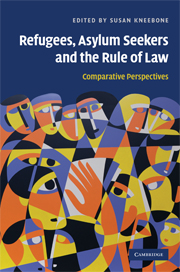Book contents
- Frontmatter
- Contents
- Contributors
- Foreword
- Preface
- Introduction: Refugees and Asylum Seekers in the International Context – Rights and Realities
- 1 The Rule of Law and the Role of Law: Refugees and Asylum Seekers
- 2 Asylum and the Rule of Law in Canada: Hearing the Other (Side)
- 3 Refugees, Asylum and the Rule of Law in the USA
- 4 The Australian Story: Asylum Seekers outside the Law
- 5 The Intersection between the International, the Regional and the Domestic: Seeking Asylum in the UK
- 6 Conclusions on the Rule of Law
- Appendix
- Bibliography
- Index
Introduction: Refugees and Asylum Seekers in the International Context – Rights and Realities
Published online by Cambridge University Press: 10 December 2009
- Frontmatter
- Contents
- Contributors
- Foreword
- Preface
- Introduction: Refugees and Asylum Seekers in the International Context – Rights and Realities
- 1 The Rule of Law and the Role of Law: Refugees and Asylum Seekers
- 2 Asylum and the Rule of Law in Canada: Hearing the Other (Side)
- 3 Refugees, Asylum and the Rule of Law in the USA
- 4 The Australian Story: Asylum Seekers outside the Law
- 5 The Intersection between the International, the Regional and the Domestic: Seeking Asylum in the UK
- 6 Conclusions on the Rule of Law
- Appendix
- Bibliography
- Index
Summary
This book uses the idea of the ‘Rule of Law’ to illuminate how the legal systems in five industrialized countries which share a common legal heritage – namely Canada, the USA, Australia, New Zealand and the UK – have responded to issues about the rights and status of refugees and asylum seekers. This is a particularly important issue in its own right because, as explained in Chapter 1, the rule of law, which is the cornerstone of the concept of democracy and of modern legal systems, is challenged by its application to refugees and asylum seekers. It is also important for a second reason. The rights of refugees are defined in international law, but are subject to state discretion as to their implementation in national legal systems. As the chapters in this book reveal, implementation is being done in such a way as to deny refugees the rights which are due to them under the international regime of refugee protection. Thus the international rule of law is also being eroded by implementation at the national level.
This raises the issue of the interconnectedness of the national and the international rule of law. Should the rule of law be regarded only as a ‘national enterprise’, as Audrey Macklin queries? How can coherency between the national and the international rule of law be achieved? These are issues addressed in this book.
- Type
- Chapter
- Information
- Refugees, Asylum Seekers and the Rule of LawComparative Perspectives, pp. 1 - 31Publisher: Cambridge University PressPrint publication year: 2009
- 2
- Cited by



